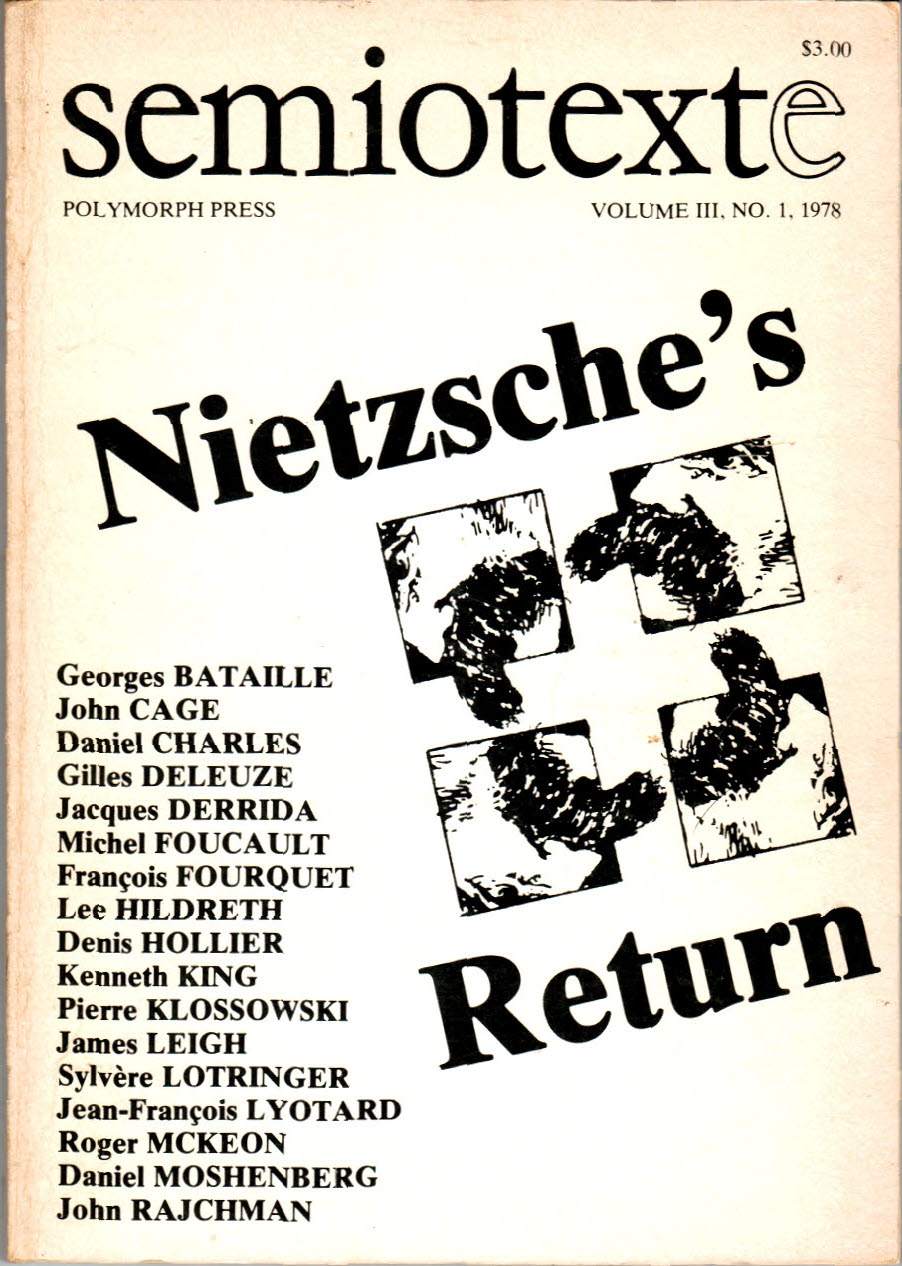Friedrich A. Kittler: Literature, Media, Information Systems: Essays (1997)
Filed under book | Tags: · information theory, literary theory, literature, media theory, philosophy, technology

An early collection of the writings of Friedrich Kittler in English translation.
The following essays are included: “Gramophone, Film, Typewriter”, “Dracula’s Legacy”, “Romanticism–Psychoanalysis–Film: A History of the Double”, “Media and Drugs in Pynchon’s Second World War”, “Media Wars: Trenches, Lightning, Stars”, “The World of the Symbolic–A World of the Machine”, “There Is No Software” and “Protected Mode”.
Edited and Introduced by John Johnston
Publisher OPA, Amsterdam, 1997
ISBN 9057010712
192 pages
PDF, PDF (updated on 2017-5-2)
Comments (5)Semiotext(e), 3(1): Nietzsche’s Return (1978)
Filed under journal | Tags: · linguistics, literature, philosophy, psychoanalysis, semiotics

With contributions by Georges Bataille, John Cage, Daniel Charles, Gilles Deleuze, Jacques Derrida, Michel Foucault, François Fourquet, Lee Hildreth, Denis Hollier, Kenneth King, Pierre Klossowski, James Leigh, Sylvère Lotringer, Jean-François Lyotard, Roger McKeon, Daniel Moshenberg and John Rajchman.
Edited by Sylvère Lotringer
Publisher Semiotext(e), New York, 1978
ISSN 00939579
157 pages
via esco_bar
See also Semiotext(e), 3(2): Schizo-Culture (1978)
Comments (3)Thomas Ort: Art and Life in Modernist Prague: Karel Čapek and his Generation, 1911-1938 (2013)
Filed under book | Tags: · 1910s, 1920s, 1930s, art, art history, austria-hungary, avant-garde, cubism, czechoslovakia, history of literature, literature, philosophy, poetry

“In most histories of Europe before the First World War, modern life in Habsburg Mitteleuropa takes on a decidedly gloomy cast. Centering on Vienna in the twilight years of the Austro-Hungarian Empire, such accounts describe the failure of rationalism and the rise of a dangerous politics of fantasy. This book tells a different story, highlighting a generation of Czech writers and artists distinguished by their affirmative encounter with the modern world in the first decades of the twentieth century. Novelist and playwright Karel Čapek, along with other members of his cohort, embraced the possibilities of the post-Habsburg era. Tracing the roots of Čapek’s generation to cubist art and turn-of-the-century philosophy, author Thomas Ort shows that the form of modernism they championed led not into the thickets of fascism or communism but in fact closer to liberal political ideals.”
Publisher Palgrave Macmillan, 2013
Palgrave Studies in Cultural and Intellectual History series
ISBN 1137188863, 9781137188861
276 pages

